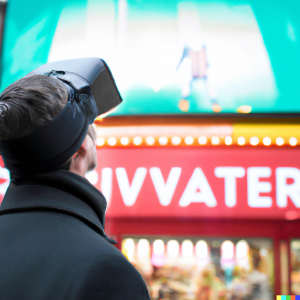
The Metaverse, a virtual reality environment which seems to be the great promise for the future of the internet, at the same time poses questions and doubts on the real and effective implementation of it, as well as the problem of data collection and protection.
Describing the Metaverse is not an easy job, since being a relatively new concept, is perceived in many different ways, making it a vague and blurred concept in the eyes of an everyday internet user. The confusion goes on regarding what this world will really look like, how to interact on it and most importantly for the object of our research, how our data will be stored and treated in this new platform.
The idea of the Metaverse has been around for three decades, but it is until recently that we hear about it everywhere, especially with the rebranding of Facebook as “Meta” (recently on the news for some rumors) and from some other providers, spreading the concept and acquiring recognition worldwide.
A big opportunity for businesses, a risk for the everyday user
As Metaverse is supposed to contain workplaces, shops, leisure, entertainment and more, for companies and advertisers being on it would represent a golden opportunity and a major resource for data collection. Businesses could thrive in a, for instance, Metaverse store environment: imagine people walking through down a street (through their digital avatars) where brands and online stores on the side as in the real world, giving and transmitting tons of data on how the customers react to the products exposed. How the customers behave, what keeps them engaged and what they like to see, these are just some kinds of data collected in this new world. This data is already collected nowadays, but with Metaverse data gathering might be way more far-reaching and powerful than has ever been before.

“The metaverse will be data collection on steroids.”
A Metaverse environment could take the data registration to the next level: we are not talking only about basic information as contact one, but also what is called biometrically inferred data (BID). This is already happening with facial recognition and fingerprint technology included in many mobile devices, nevertheless other physical data as for instance the size of your hand, your eyes scrolling through a page, in addition to behavioral, psychological data and other non-verbal communication data. “The metaverse will be data collection on steroids.” , as stated by Mastercard’s chief privacy officer Catherine Louveaux in her recent blogpost. People accessing the Metaverse might be at a greater risk of leaving their data behind without noticing, especially at the beginning when lacking concrete and immediate regulations as a new innovation appears on the horizon.
How will we manage the data in this new reality? Portability and data ownership
Many questions come to our mind when talking about data management in the Metaverse, and we could sum it up in three different points: privacy, safety/integrity, equity and inclusion. Not only a data protection system is required in defense of the privacy of the users, but at the same time giving them the tools to feel safe and secure, while making technologies inclusive and equitable, for everybody to get access to them.

It is fundamental to establish data portability and ownership according to Forbes, for users to have the possibility to transfer their digital possessions from a storage place to another in the most secure way. Both general users and companies need to be concerned about data ownership: that is, again, the privacy of their data. This is because the audience’s behaviours will be tracked in a more deep, intricate and elaborate way, but also identity could be at risk of falsification through the hacking of avatars, to not speak about bots and spam problems. Therefore, guidelines need to be established to understand how data is really collected and shared, creating safe “guardrails” for users’ protection.
Watch this interesting video on the risks of privacy in the Metaverse to know more!
A decentralization of data power and possession? The blockchain solution
If from one side the metaverse poses doubts on the ethical, privacy and security level, from the other it could entail a decentralization of the power on data, creating a more open economy with multiple actors involved and producing a shift from Big Tech dominion to an empowerment of people who could have an array of choices among different providers – concept that can be summed up as Web3.
This decentralization could happen through blockchain technology, meaning more freedom for consumers to choose the company they want and an absence of monopoly of data hosting, as we have in our current digital world.
Watch this video to learn what the Web3 is!
When the Metaverse goes mainstream
We can not completely predict what will happen with our data once the Metaverse goes mainstream, but for the moment this ambitious VR environment is still developping and surely will not be accessible to everybody in the short-term- as shown by the “pro” VR headset designed by Meta costing around 1500 dollars – being far from accessible for everyone.
Nevertheless, we can already understand and be aware of the possible risks that could entail for the privacy, security and ethical aspects of a digital VR environment such as Metaverse, risks that are actually more closer than ever, if you look around. For instance the Interpol just launched its Metaverse version, even if only for training courses at the moment. Their aim however, as crime has increasingly moved online because of the high pace of digitalization, is to adopt it to guarantee and to protect communities.

What is your opinion about the Metaverse and its future? Do you envision a decentralization of data power within the Metaverse or do you think it will accentuate even more the power of Big Tech companies? Comment below!
Sources:
Z Allam, The Metaverse as a Virtual Form of Smart Cities, Smart Cities, MDPI, 2022. https://www.mdpi.com/

